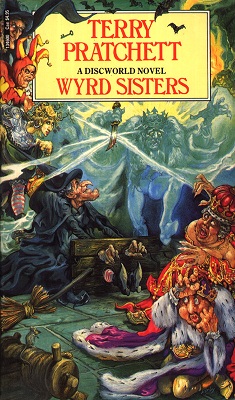The wind howled. Lightning stabbed at the earth erratically, like an inefficient assassin. Thunder rolled back and forth across the dark, rain-lashed hills.
The night was as black as the inside of a cat. It was the kind of night, you could believe, on which gods moved men as though they were pawns on the chessboard of fate. In the middle of this elemental storm a fire gleamed among the dripping furze bushes like the madness in a weasel’s eye. It illuminated three hunched figures. As the cauldron bubbled an eldritch voice shrieked: ‘When shall we three meet again?
There was a pause.
Finally another voice said, in for more ordinary tones: ‘Well, I can do next Tuesday’.

Wyrd Sisters
Terry Pratchett
331 pages
published in 1988
The opening paragraphs of Wyrd Sisters are a good indication of the rest of the book. This is MacBeth: Discworld style and the witches do not intend to stick to the script. That’s because Granny Weatherwax and Nanny Ogg are sensible witches and while the third member of the coven is a bit wet — as in, she actually believes in such things like covens — Magrat Garlick still has a steel core of good Lancrian common sense. They know better than to meddle in affairs (well, mostly) or dance with demons, never mind doing it skyclad. Yet when the king is murdered, his baby heir disappears and the usurper duke turns out not be just a bit evil, but actually uncaring about the land, they’re dragged into meddling against their own will.
This then is the first proper Witches novel, introducing Nanny Ogg and Margrat Garlick as well as a better worked out Granny Weatherwax than the one we’ve met in Equal Rites. As characters they conform to the old witches stereotype of the maiden (Magrat), the mother (Nanny Ogg) and the other one (’nuff said). Nanny Ogg in particular fills her role well, being earthy and salty and in good humour msot of the time, which you can usually tell by which couplet she has gotten to in the hedgehog song. Magrat on the other hand is the sort of witch who believes in crystals and such, while Granny Weatherwax is not just bossy compared to other people, she’s bossy compared to other witches… They’re some of Pratchett’s best creations.
They’re also representative of his philosophy. They’re stubborn, hardheaded, sometimes obnoxious, emotional, not very friendly, but when push comes to shove they’re on the right side. The duke meanwhile isn’t evil as much as he’s uncaring. He has killed the previous king because he wanted the power of being the ruler, not because he cared for the country he would rule. Whereas the previous king might’ve burned down houses and exercises his droit seigneur (a large dog), he did it in a personal way, rather than just because they were in the way. It’s the sort of evil we’ll encounter a lot more of in the Discworld series and had already seen in Sourcery.
Another Pratchett theme we’d see more is that of the power of speech and how it can change the world as it changes people’s perspectives, here worked out for the first time. The witches are traditionally feared but respected and much of that is due to how they represent themselves. People see the pointy hats and they think witches. So when they speak, people listen. But as the duke finds out, that authority can be challenged by a whisper campaign, by pointing out that these are just a bunch of foolish old women, that they are responsible for evil things, that they’re not very nice. In the end, the struggle between the duke and the witches comes down to who can offer the better narrative.
At this point in the series Pratchett has clearly found his stride and it shows. The writing sparkles, the plot’s tight and it’s all a bit better than earlier novels in the series.